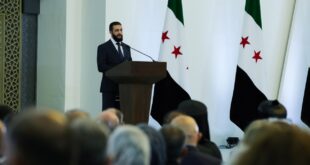Hama, SANA – President Bashar al-Assad, his wife, and their children visited a number of injured Army and Armed Forces personnel in their home villages in Hama countryside.
In Tal Aafar village, President al-Assad and his family visited Mohammad Ahmad Khalil who sustained injuries in the line of duty that caused disability rated at over 90%, and who received treatment and care by “Jarih al-Watan” program which also helped him start a project for raising sheep.
President al-Assad and his family also visited Fatir Hassan Mansour in the village of Rabou, who was also injured while fighting terrorists leading to disability rated at over 90% as well. He, like Khalil, was also helped by Jarih al-Watan program to start a project.
In Matna village, President al-Assad and his family visited Ahmad Mohammad al-Ali, who is currently raising livestock with the help of the program, while in Deir Shmail village His Excellency and his family visited Ayham Mahmoud Dunya, who was unable to walk after being injured but today he received President al-Assad on his feet. He as well received support from the program including prosthetics, surgery, and helping him start a project.
Jarih al-Watan (Injured of the Homeland) program was launched by the Presidency of the Syrian Arab Republic in 2014 to support wounded people and provide their needs, particularly those who sustained injuries that prevent them from returning to their normal lives. It provides prosthetics to the injured and helps them start productive projects, in addition to providing assistance to those who suffer full disability. The project targets all wounded members of the Army and Armed Forces and supporting forces.
https://www.youtube.com/watch?v=BzikKSemG0I
Hazem Sabbagh
 Syrian Arab News Agency S A N A
Syrian Arab News Agency S A N A













